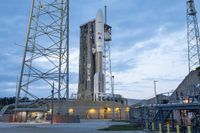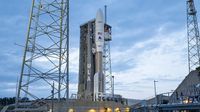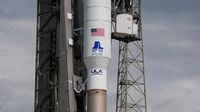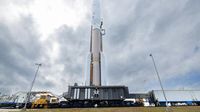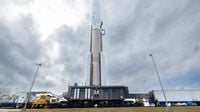Amazon is set to launch its first batch of production satellites for Project Kuiper on Wednesday, April 9, 2025, using a United Launch Alliance (ULA) Atlas V rocket. This mission, known as Kuiper 1 or Kuiper Atlas 1 (KA-01), will carry 27 satellites into low Earth orbit from Cape Canaveral Space Force Station, marking a significant milestone in Amazon's efforts to establish a global internet network.
The launch is scheduled for 7 p.m. EDT (2300 UTC) and will take place from Launch Complex 41. ULA's Atlas V rocket, equipped with five solid rocket boosters, is designed to deliver the satellites, which are part of Amazon's ambitious plan to rival existing satellite internet providers like SpaceX's Starlink and Eutelsat's OneWeb.
In a media roundtable held on April 7, 2025, ULA President and CEO Tory Bruno expressed optimism about the launch, although he noted potential delays. "I don’t think I’ll get all of the Atlases off for them this year. I think it’ll be ’26 before we get them all done," he stated, indicating that Amazon has eight remaining Atlas 5 rockets for its Kuiper satellites.
The launch weather forecast, provided by the 45th Weather Squadron, predicts a 55 percent chance of favorable conditions, with concerns about cumulus clouds and strong winds. Meteorologists explained that a cold front moving through central Florida could bring isolated showers, but the forecast is expected to improve as the launch time approaches.
Once airborne, the Atlas V rocket will follow a north-easterly trajectory, delivering the satellites to their designated orbits. The Project Kuiper constellation is envisioned to eventually consist of over 3,200 satellites, spread across 98 orbital planes at altitudes of 590 km, 610 km, and 630 km. For perspective, the International Space Station orbits at an altitude of 370-460 km.
Rajeev Badyal, Vice President of Technology for the Kuiper Satellite Network, highlighted the complexity of the Project Kuiper satellites. "We have set out to design the most advanced satellite network ever built and we have created the whole thing in-house at Amazon," he said. The mission will be critical for Amazon to begin offering commercial internet services, as the company is required by the Federal Communications Commission (FCC) to have at least 578 operational satellites before launching customer services.
In addition to the Atlas 5 launches, Amazon has secured 38 launches on ULA’s Vulcan rocket and a combined 33 launches on other platforms, including Arianespace’s Ariane 6, Blue Origin’s New Glenn, and SpaceX’s Falcon 9 rockets. This extensive launch strategy underscores Amazon's commitment to building a robust satellite internet constellation.
Project Kuiper is not solely focused on commercial internet services. Amazon has also established Kuiper Government Solutions (KGS), a separate entity designed to provide specialized government capabilities. Recently, KGS announced a partnership with L3Harris Technologies to offer a combined service for government needs, emphasizing the potential for secure and resilient communication solutions.
As the launch date approaches, excitement is building not just in Florida but across the eastern United States. The Atlas V rocket is expected to be visible from as far north as Ohio and New York, depending on weather conditions. Observers in cities like Cleveland, Columbus, and Cincinnati may catch a glimpse of the rocket approximately 330 seconds after liftoff.
For those interested in watching the launch, ULA will provide a live stream starting about 20 minutes before liftoff. The mission represents a significant step forward for Amazon in the competitive satellite internet market, and the success of this launch could pave the way for future missions.
As the countdown continues, ULA remains vigilant about weather conditions, which have posed challenges in the past. The launch team is prepared to adjust the schedule if necessary, with the two-hour launch window extending until 9 p.m. EDT. With all eyes on Cape Canaveral, the anticipation for Project Kuiper's inaugural satellite launch is palpable.
The Project Kuiper initiative aims to connect billions of people worldwide through a network of ground-based antennas and satellites, providing fast and reliable internet access, particularly to underserved communities. This mission highlights the ongoing battle in the billion-dollar space race between tech titans like Jeff Bezos and Elon Musk, as they vie for dominance in the burgeoning satellite internet market.
In summary, the launch of Amazon's Project Kuiper satellites represents a pivotal moment for the company and the future of global internet connectivity. As the world watches, the outcome of this mission could reshape the landscape of satellite communications.

